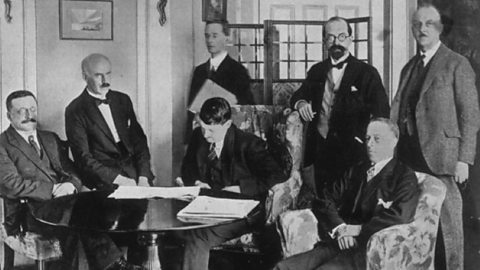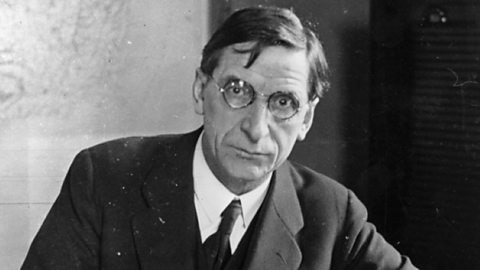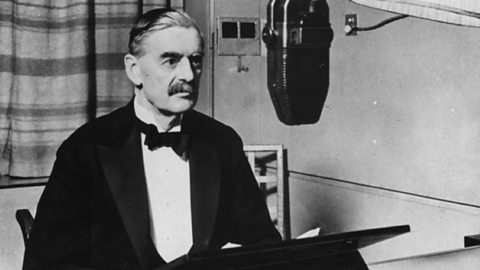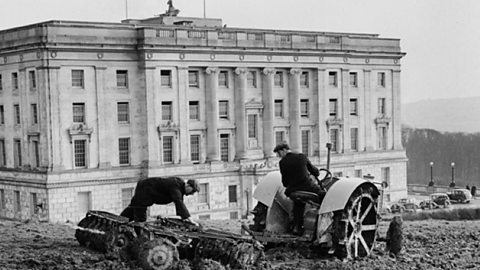Constitutional changes in Ăire and its effects
The members of the Inter-Party governmentA coalition government containing Fine Gael, Clann na Poblachta, two different Labour Parties, a Farmers Party and twelve independent members of the ¶ÙĂĄŸ±±ô. It was in power from 1948-1951., particularly Clann na PoblachtaAn Irish political party (now defunct) established by former Chief of Staff of the Irish Republican Army SeĂĄn MacBride., felt that the Bunreacht na hĂireannNew constitution of Ăire in 1937. A constitution sets out the rules by which a country is organised and governed. had made Ăire a republicA country that is not governed by a monarch. Instead, the Head of State is usually elected by the citizens of the country, and generally known as a president. in all but name.
In 1948, the Taoiseach, John A Costello, unexpectedly announced that Ăire would repeal the External Relations Act 1936A law which diminished the British monarch's authority in the Irish Free State. and become a republic.
Although nationalistPeople who believe their country should be independent from other nations. For example, Irish nationalists, who want Ireland to be fully independent of Britain. had always sought independence, the timing of the announcement came as a shock to many.
Costello supported independence for a number of reasons:
- He wanted to make the international status of the country clear.
- He was trying to entice republican voters away fromFianna FĂĄilAn anti Anglo-Irish Treaty party when founded by Ăamon de Valera in 1926, Fianna FĂĄil has held power for most of the years since 1932. and strengthen his new Inter-Party government.
- The Anti-Partition League, formed by Northern Ireland nationalists in 1945, and Clann na Poblachta were gaining support due to their position on this matter.
- He hoped to take the gun out of politics by depriving the Irish Republican Army (IRA)A republican paramilitary group which was determined to create an Irish Republic as proclaimed in the 1916 Easter Rising. of a reason to resort to arms.
- There was increasing confidence in the country that Ăire could make a success of total independence.
Republic of Ireland Act, 1949
In November 1948, the Republic of Ireland Bill was introduced, becoming law on Easter Monday 1949.
At the same time. the External Relations Act 1936A law which diminished the British monarch's authority in the Irish Free State. was repealed.
ĂŸ±°ù±đ:
- Formally became a republicA country that is not governed by a monarch. Instead, the Head of State is usually elected by the citizens of the country, and generally known as a president..
- Left the CommonwealthAn association comprising the UK, its dependencies, and many former British colonies..
Reaction to the Republic of Ireland Act, 1949
Reaction in Ăire
Reaction in Ăire was mixed:
- Although there was overall approval for independence, many nationalistPeople who believe their country should be independent from other nations. For example, Irish nationalists, who want Ireland to be fully independent of Britain. had reservations about the Act because it seemed to make partition/partitionedThe division of a country into two regions. permanent.
- Ăamon De Valera disapproved of the legislation.
- A very active lobbyingInfluencing the decisions of the government on policies and issues. campaign to end partition was begun in the United Nations (UN)The successor to the League of Nations, the United Nations was established in 1945 as an international organisation designed to keep peace, uphold international law and set standards in human rights. and among Irish-American voters in the USA.
- Speaking tours of Britain and Australia were undertaken. However, these were not as successful as they had hoped; for example, their offer to join NATONorth Atlantic Treaty Organisation - a military alliance of Western powers originally set up (in April 1949) to provide a counterforce to the Soviet armies of Eastern Europe. in return for USA support for ending partition was rejected. (Ăire had refused to join NATO as it wanted to retain its neutrality.)
- Some felt force was the only way to achieve an end to partition and, in 1948, placards in Dublin read, âArm now to take the Northâ.
Reaction in Northern Ireland
In Northern Ireland, attitudes towards the Republic of Ireland Act, 1949Act which formally made Ăire a Republic and removed the country from the Commonwealth. were divided.
Nationalists
Northern nationalistPeople who believe their country should be independent from other nations. For example, Irish nationalists, who want Ireland to be fully independent of Britain. were unhappy with the Republic of Ireland Act because:
- partition/partitionedThe division of a country into two regions. continued.
- They felt abandoned by Ăire.
- They rejected the Irish Governmentâs claim it represented the whole of the island and they were disappointed that their request to have TDTeachta DĂĄla or member of the ¶ÙĂĄŸ±±ô (the lower house in the Irish parliament). sit in the ¶ÙĂĄŸ±±ôThe lower house in the Irish parliament. was refused.
- They refused to call Ăire the Irish Republic and continued to refer to it as the Free State.
Unionists
unionistA person who believes the union between Britain and Northern Ireland should continue. felt threatened.
In particular they:
- Resented the Actâs claim to have authority over all of Ireland.
- Saw the Act as a threat and the first step in the creation of a united Ireland.
- Prime Minister Basil Brooke rejected Dublinâs offer of âany reasonable constitutionRules by which a country is organised and governed.guaranteesâ for Protestants if they agreed to end partition. He said, âUlster is not for saleâ.
The Anti-Partition League and 'The Chapel Gate Election' 1949
Brooke used the border issue as the justification for calling a general election, held in February 1949.
He wanted the people of Northern Ireland to show Britain they supported partition/partitionedThe division of a country into two regions..
Moreover, unionistA person who believes the union between Britain and Northern Ireland should continue. were very alarmed by vocal nationalistPeople who believe their country should be independent from other nations. For example, Irish nationalists, who want Ireland to be fully independent of Britain. demands on the international scene for an end to partition.
Nationalists were urged to vote for a united Ireland and were particularly influenced by the Anti-Partition LeagueOrganisation formed in 1945 by Northern nationalists to end partition. which fielded many candidates in the election.
- The League had been set up in 1945 to provide an effective and united organisation for all those opposed to partition. It had been very disappointed with de Valeraâs lack of progress on ending partition and was determined to make headway on the issue.
- The League grew rapidly, with its main support coming from rural areas and among Catholic small business owners in the north. It also had support from âFriends of Irelandâ (a back-bench Labour Party group) in England and from the USA.
- It called for the support of its backers in the Republic of Ireland and, as a result, it was agreed to set up an âanti-partition fundâ to help finance the election campaign.
The election became known as the âchapel gate electionâ as much of the money used to fund the nationalistsâ campaign was raised mainly through collections outside churches in the South.
This caused great resentment within the unionist community and the election campaign was tainted by many sectarianBelonging to a religious or political group and being intolerant of those with different opinions. If you're a religious sectarian, you are loyal to a particular religious sect or group. clashes.
The results of 'The Chapel Gate Election' 1949
The result was an increased share of votes and seats for both unionistA person who believes the union between Britain and Northern Ireland should continue. and nationalistPeople who believe their country should be independent from other nations. For example, Irish nationalists, who want Ireland to be fully independent of Britain., with the former still controlling Stormont.
However, whilst unionists increased their share of the vote, they continued to feel insecure and greatly resented Ăireâs interference in a northern election.
They also sought guarantees from Britain that Northern Ireland would remain within the United Kingdom.
After 1949, the Anti-Partition LeagueOrganisation formed in 1945 by Northern nationalists to end partition. began to decline because of poor election results and a general lack of interest in campaigning against partition/partitionedThe division of a country into two regions..
Reaction in Britain
Dublin was worried that Britain would react negatively to the declaration, given that Ăire was the first country to leave the CommonwealthAn association comprising the UK, its dependencies, and many former British colonies..
In addition, there was already longstanding ill-feeling between the two countries.
However, Australia and Canada supported Ăire, stating that there was no reason why an Irish republicA country that is not governed by a monarch. Instead, the Head of State is usually elected by the citizens of the country, and generally known as a president.could not continue to work closely with the Commonwealth.
In the end, the response in Britain to the Republic of Ireland Act, 1949Act which formally made Ăire a Republic and removed the country from the Commonwealth. was more measured than expected.
It decided not to treat Ăire as a foreign country but as a near neighbour with whom it had a special relationship.
Quiz: Reaction to the Republic of Ireland Act
Impact on relations
Ireland Act, 1949
The resulting Ireland Act â passed by Westminster in 1949 - stated that:
- Passports were not needed for travel between the two countries.
- Ăire citizens working in Britain could claim welfare benefitsMoney to support people eg due to unemployment, illness or disability..
- Working permits were not required for Irish workers in the UK or British workers in the Republic of Ireland.
- Citizens of both nations had voting rights in each otherâs elections - if they were living in the other country.
- Ăire would continue to enjoy preferential treatment regarding trade.
The Act also stated that the Northern Ireland Parliament had been given the final word in any future debate about the ending of partition/partitionedThe division of a country into two regions..
As a result:
- unionistA person who believes the union between Britain and Northern Ireland should continue. were satisfied with these guarantees. Their control of Northern Ireland was confirmed and partition made much more difficult to end.
- Dublin and Northern nationalistPeople who believe their country should be independent from other nations. For example, Irish nationalists, who want Ireland to be fully independent of Britain. were outraged and strongly expressed their displeasure with the Act, particularly the guarantees regarding partition.
Dublinâs foreign policy focus became persuading London to remove the border.
However, nothing was changed.
Clement Attlee felt that, as Dublin had not consulted him about the declaration of the Republic, he was free to give whatever guarantees he wanted to Northern Ireland.
WATCH: Constitutional change in Ăire and its effects
Test your knowledge
More on Changing relations: Northern Ireland and its neighbours, 1920-49
Find out more by working through a topic
- count1 of 8

- count2 of 8

- count3 of 8

- count4 of 8
